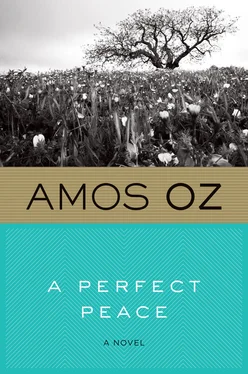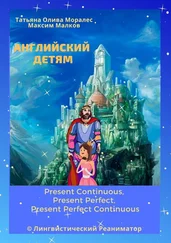What was Shiko doing in the wadi in the middle of the night when he found out that Avigayil had decided to leave him? And why had she? And what had Ron's friend already heard a hundred times? Yonatan was too tired to pursue it. Besides, it was too noisy to try to pick up the rest of the conversation because a many-wheeled truck that looked more like a freight train was struggling to maneuver its way into the narrow side street.
The turn was too sharp for it. Its gigantic wheels had chewed up the curb, and now one of its sides was crushing a municipal garbage receptacle hanging from a green metal post. The air brakes let out still another whoosh. A crowd began to form and to shout their advice, censure, and ridicule, all of which the driver, high in his cab, chose to ignore. Furiously the vehicle sought to fight its way into the street, uprooting a traffic sign and scraping a wall like a bull in heat. The sandstone of the damaged building poured down in a granular cascade. At this point, or so it seemed, the driver began to consider a retreat. He struggled with the gears and pulled as hard as he could on the wheel, as if tugging at the bridle of a recalcitrant animal. All of a sudden the monster lurched backward, and the crowd let out a gasp — less than a hair's breadth now separated the back of the truck from the window of a pastry shop across the street. Once more the driver grasped the wheel and, breathing hard, wrested it all the way in the opposite direction. Gripping it tightly to prevent it from getting away, he battled the shift stick until he finally got the truck into gear, and the beast lurched forward only to become stuck, with either end smack up against a wall.
The steadily growing crowd surged around it, swearing at the driver or kicking the truck's tires, clucking its collective tongue, calling out its brainstorms, inspirations, ingeniously improvised solutions. At last, as a long line of backed-up traffic began rending the air with deafening honks, one resolute bystander stepped out of the throng to take the bull by the horns. This hero, who looked like a cowboy and was none other than the rude-limbed, rough-voiced, sun-scorched officer who had been sitting in the cafe with his baby-faced friend, pulled himself up the side of the truck by the door handle and, shouldering the driver aside, forced his way into the cab. Once there, he calmly stuck his neck out the window to survey the battleground below. He looks just like a water buffalo, thought Yonatan, and laughed quietly to himself. He didn't give a hoot about any of it.
What time could it be? His watch had stopped running, though, judging by the light, it must be close to noon. A large, good-looking woman, brown from the sun, had just stepped into the cafe and sat down by herself at a small corner table. Her fingers festooned with many rings, she lit herself a cigarette. The Rumanian counterman came running and, with a great show of courtesy, placed before her a glass of tea, a spoon, a sugar bowl, and a slice of lemon on a dish. "Mr. Gotthilf," laughed the woman in a low, throaty voice, "Mr. Gotthilf, what's wrong with you? You look like a ghost. I hope to God you're not getting sick."
"Only of life," joked the counterman. "That's the one sickness we're all one-hundred-percent sure to die of. Would you like something to eat, Jacqueline?"
The woman shook her head. She had ceased concentrating on Mr. Gotthilf because she had become aware of Yonatan's glances and decided to return them with a mocking, sideways stare that seemed to say, All right, mister, it's your turn. Let's see what you can do.
And all the while customers kept coming and going, all suntanned and windburned, all eating and drinking and guzzling away, all talking in loud, rasping voices. A goddamn good place to be by yourself. And a goddamn good thing that your watch has stopped and that you feel a little sleepy too. Can it be one o'clock? Two? Two-thirty? What difference does it make? From now on, all hours are going to be the same.
The hubbub outside had ceased. The cab of the truck was now at right angles to its trailer. A sweating policeman hopped around it like a cricket, trying to direct traffic, while Captain Water Buffalo and the truck driver sat smoking by the exhausted engine like two comrades-in-arms gone down to a joint defeat. Apparently they did not blame each other but rather some unfriendly act of God. There was nothing to do but wait. Besides, they're sure to build a highway here some day and all these old Turkish buildings now in the way will be shipped off to Saudi Arabia. Till then, what's the rush?
Yonatan rose and paid his bill, muttered something to the counterman, and forced himself to say "See you, baby," to the good-looking woman but grinned at the floor as he did so. Everything was right on schedule. The desert was still waiting for him. He hoisted his gear onto his back and walked out of the cafe with leaden strides. Was he really all that tired? Not really. In fact, quite the opposite — groggy but rested, as if he'd just slept for twenty hours straight. Why, he had slept away all the years of his life like a log and now he was awake as all hell. There must be a Russian saying for it. What the hell? Not mea culpa.
At an army hitchhiking post at the edge of town Yonatan was greeted by a smell of sweat, smoke, rifle oil, and dry urine. On the asbestos wall of the shelter someone had scratched a crude pair of fat, outspread thighs and, between them, a floating penis that resembled a mortar barrel but had an open eye in the act of shedding a tear. Above it the artist had scratched the words GOOD TO THE LUST DROP.
Yonatan, who was the only one waiting for a ride, eventually decided that this caption needed correction. He first thought of scratching on the penis, with the sharp corner of an ammunition clip, FUCK EVERYTHING. And then, over the whole drawing, MEA CULPA. Or THREE CHEERS FOR JUSTICE. In the end, he contented himself with crossing out GOOD TO THE LUST and inserting the word DEAD after DROP. As he did so, two ragged-looking reservists pulled up in a decrepit old command car, one wearing a heavy army overcoat, the other with his head and shoulders wrapped in a gray blanket. Without a word Yonatan clambered in the back, dumped his gear on a pile of similar belongings, cuddled up in his windbreaker, and squatted comfortably on a stack of greasy tarpaulins. As soon as they set out, the increasing speed of the vehicle hammered exhilaratingly in his veins. He narrowed his eyes against the wind and gulped its cold, astringent blows deep into his lungs. Gritty particles picked up from the road slashed at his face. In his hand, he held firmly the ammunition clip with which he'd recaptioned the lewd drawing in the shelter.
For a long while out of Beersheba, the fringe of the desert sprouted with fields of coming Bedouin wheat, as though its soft hills had been tinted by a brush as far as his watering eyes could see — a lovely pastel green, rippled now and then by the wind, gleaming here and there with dazzling pools of rainwater, growing fainter as it stretched to meet the pale blue horizon, where a transcendent compromise seemed to have been reached between the color of the sky and the color of the grain. A promised reconciliation.
Far away, in a place where the heavens descended gently on earthly fields, there was love in this world. All would end happily there. A perfect peace.
Between him and that place endless waves were billowing across an endless expanse. Field after lonely field. Flat earth bounded by soft hills, flat earth stippled by droplets of light, all the way to the edge of the world, with only a single road to spear it like a black arrow, answered only by the roar of a motor. This is life. And the world. And me. And love. Just wait peacefully and you will receive it. Just go on resting and all will be given you. Everything is waiting. All things are possible. The magic is on its way.
Читать дальше












